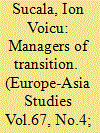| Srl | Item |
| 1 |
ID:
096242


|
|
|
|
|
| Publication |
2010.
|
| Summary/Abstract |
This article examines how the Hungarian crisis and Soviet interventions strengthened the position of the Romanian communist leadership. First, it eroded the respect of several Bucharest officials for the Soviet army, reinforcing their desire to see Soviet troops leave Romania. Second, the crisis brought back memories of earlier historical events that seemed to provide 'proof' of Hungarian bellicosity, which the Romanian leadership used to discriminate against ethnic Hungarians in Romania. Third, the crisis aroused fears of Transylvanian irredentism, which Bucharest used to control the population. Fourth, by incarcerating Imre Nagy, Bucharest leaders could witness his suffering, which motivated them to avoid his fate.
|
|
|
|
|
|
|
|
|
|
|
|
|
|
|
|
| 2 |
ID:
139273


|
|
|
|
|
| Summary/Abstract |
The article presents the perspectives of managers as part of the Romanian organisational elite on the communist regime and on the transition period, and the values and principles that informed their behaviour as managers in each period. For the first decade after the end of communist rule, managers were drawn mainly from the second level of management of the state-owned enterprises of communist times. As a group they had been selected and formed in late communism. Among the main advantages of this social group were that they demonstrated considerable survival capacity, ideological neutrality and an ability to manoeuvre in a turbulent environment. On the other hand they had to adapt to their new environment drawing on the skills and mentality they had developed under the old regime. The research employed a qualitative method based on the interpretation of conversations between managers and students.
|
|
|
|
|
|
|
|
|
|
|
|
|
|
|
|
| 3 |
ID:
127688


|
|
|
|
|
| Publication |
2014.
|
| Summary/Abstract |
This article provides a new synthesis on the origins of self-management in Yugoslavia on the basis of new archival research. It rejects the dominant view in the historiography that self-management arose merely as an ideological justification for the split with Stalin's USSR in 1948. Rather, it demonstrates that the introduction of workers' councils was part of an elaborate effort on the part of the Communist leadership to return to its pre-1948, proto-'reform Communist' strategy that was remarkably open to interaction with the world market. This is shown to have implications for understanding Yugoslavia, Eastern Europe, the Cold War and Communism.
|
|
|
|
|
|
|
|
|
|
|
|
|
|
|
|